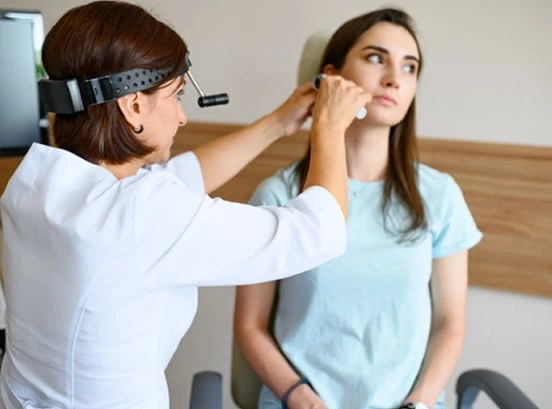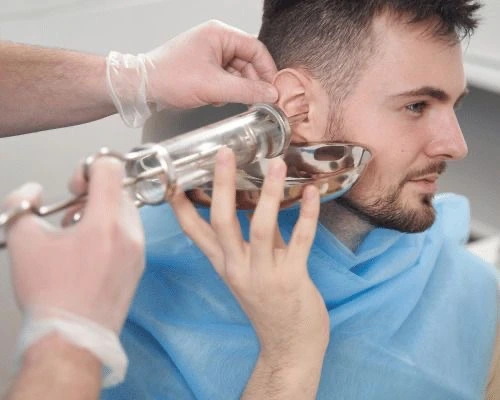Introduction: A Habit We All Need to Break

For decades, reaching for a cotton bud to clean our ears has been second nature.
It’s something many of us learned from childhood, believing it keeps our ears clean and healthy.
However, this common practice is not just ineffective—it’s potentially dangerous.
In this blog, we’ll break down why using cotton buds for ear cleaning is a mistake, the risks involved, what the experts say, and safe alternatives to keep your ears healthy without risking damage.
The Big Myth: “Cotton Buds Keep Your Ears Clean”
It seems logical: a small tool designed with soft cotton, perfect for removing earwax buildup.
But in reality, cotton buds are not designed for ear cleaning. In fact, most cotton bud packaging even states:
“Do not insert into ear canal.”
Here’s why: rather than removing wax, cotton buds often push the wax deeper into your ear canal. Over time, this can lead to wax buildup, blockages, infections, and even permanent hearing loss.

The Risks of Using Cotton Buds
Using cotton buds may feel satisfying temporarily, but the hidden dangers are serious:
1. Wax Compaction
Every time you insert a bud into your ear, you risk pushing wax closer to the eardrum, leading to compacted wax that can cause pain, dizziness, tinnitus (ringing in the ears), or even temporary hearing loss.
2. Injury to the Ear Canal or Eardrum
The skin inside your ear canal is extremely delicate.
Even slight force can lead to abrasions, bleeding, or worse, a perforated eardrum. A damaged eardrum can take weeks to heal and might require surgery in severe cases.
3. Higher Infection Risk
Small cuts and scratches from cotton buds create openings for bacteria, leading to outer ear infections (otitis externa) that cause pain, swelling, and discharge.
4. Disrupting Your Ear’s Natural Cleaning Process
Your ears have a natural, self-cleaning mechanism.
Movements like chewing and talking help move old wax outward naturally, where it flakes away unnoticed.
Using cotton buds disrupts this process, increasing your risk of blockages and infections.
What Experts Say
ENT specialists across the world agree on one simple rule:
“Never put anything smaller than your elbow into your ear.”
Your ears are self-sufficient. In most cases, they do not need manual cleaning.
When they do, it’s better to trust professional care instead of risking self-harm.

A Real Story: Patient Review
I used cotton buds all my life thinking I was keeping my ears clean. One day, I developed sudden hearing loss in one ear. Turns out, it was completely blocked with impacted wax.
I booked an appointment at Better Ears, and the microsuction process was quick, painless, and honestly fascinating to watch.
I could hear clearly again instantly after the procedure. Now I tell everyone ditch the cotton buds
— Neha S., 32 years old
Real experiences like Neha’s highlight just how common (and dangerous) this myth can be.
Safer Alternatives to Cotton Buds
If you feel like your ears need help, consider these safe options instead:
1. Microsuction Ear Wax Removal
This professional method uses gentle suction to remove wax buildup without touching the delicate eardrum or ear canal walls.
It’s quick, effective, and painless.
2. Professional Ear Irrigation
Performed by trained practitioners, this method uses carefully controlled warm water to flush out excess wax safely.
It’s much safer than using cotton buds or DIY ear candles.
3. Use Ear Drops
Over-the-counter ear drops can soften wax, making it easier for your ear’s natural processes to remove it.
Always consult with a professional before trying these.
4. Leave Your Ears Alone
If you’re not experiencing pain, discharge, or hearing loss, there’s no need to interfere.
Ears are self-cleaning organs by nature.

Conclusion: Rethink Your Routine
It’s easy to fall into the trap of using cotton buds for ear cleaning.
But now that you know the risks, it’s time to break the habit and protect your ear health the right way.
At Better Ears, we offer safe, gentle, and professional ear wax removal services tailored to your needs.
We’re here to help you hear better—safely and naturally.
Ready to make the switch?
[Book your consultation today!]
Bonus: Quick Ear Care Tips
- Dry your ears gently after bathing—never insert anything inside.
- See a professional if you experience sudden hearing loss, pain, or a blocked sensation.
- Educate family members and children about safe ear hygiene habits.